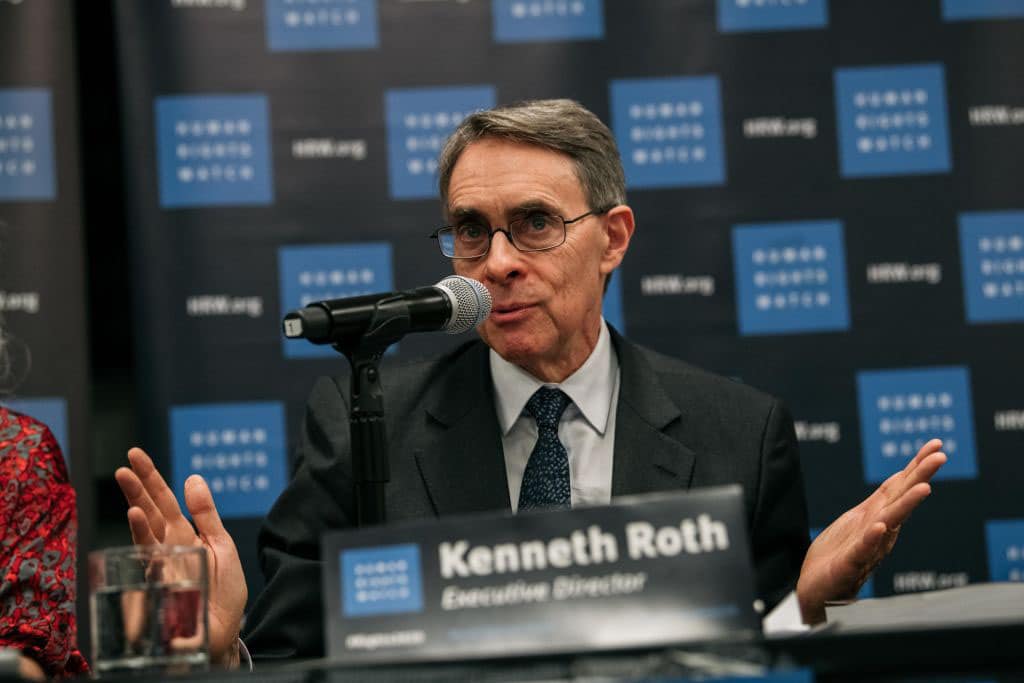 Human Rights Watch executive director Kenneth Roth speaks at a press conference at UN headquarters on January 14, 2020 in New York City. (Photo by Scott Heins/Getty Images)
Human Rights Watch executive director Kenneth Roth speaks at a press conference at UN headquarters on January 14, 2020 in New York City. (Photo by Scott Heins/Getty Images) The head of Human Rights Watch (HRW), Ken Roth, recently announced that, after 29 years, he will be leaving the organization. For nearly three decades he led HRW far from its founding principles, based on the Universal Declaration of Human Rights adopted in the shadow of the Holocaust. Instead, the group is often considered to be a political organization with a highly selective agenda and an obsession with Israel. Restoring their lost credibility, if this can be done, will require a major effort taking many years.
HRW, originally called Helsinki Watch, was founded in 1978 as an independent organization to monitor and report on rights violations in closed societies, particularly the Soviet Union, China and other dictatorships. The NGO quickly gained influence as a credible source, and eventually became the US-based counterpart to London’s Amnesty International.
Since the end of the Cold War in 1989, Roth transformed HRW into a champion of “the global left” that blames the democratic West and capitalism for the world’s problems.
Since the end of the Cold War in 1989, Roth transformed HRW into a champion of “the global left” and the post-colonialist ideology that blames the democratic West and capitalism for the world’s problems, while absolving the “victims” of human rights responsibilities. After joining this political movement, HRW was embraced in the UN and by similar-minded academics and political influencers.
The short, pro-forma criticisms of dictatorships continued, but Roth and HRW got attention and funding by condemning American-led conflicts with terror regimes in Afghanistan and Iraq, citing highly distorted versions of international law and human rights. Among other absurdities, Roth was very vocal in attacking the Obama Administration’s decision to kill Osama Bin Laden, asserting that the arch terrorist should have been arrested and tried.
Roth also showed a strong animus towards Israel, repeatedly joining the shrill voices demanding an end to American support and repeating false accusations of “war crimes” and “crimes against humanity.” HRW, in concert with Amnesty International and Palestinian groups, was central in reviving the Soviet-led effort to equate Zionism with South African apartheid. In 2001, HRW was among the leaders of the blatantly antisemitic NGO Forum of the UN Durban conference, ostensibly called to celebrate the end of South African apartheid. In responding to critics, including from within HRW, he declared that “Israeli racist practices are an appropriate topic.”
To support this agenda, Roth filled HRW’s Middle East and North Africa division with people who joined in disproportionately attacking Israel, with only token publications on Syria, Libya, Iran and other authoritarian regimes. Roth lobbied the UN Human Rights Council to create one-sided “investigations,” and pressed the International Criminal Court to adopt invented versions of international law to use against Israel, including a fictitious version of apartheid. He used the term “primitive” in the context of Jewish religion and tradition (2006), and blamed Jews for antisemitism. HRW’s April 2021 “report” claiming that Israel had “crossed the line into apartheid” is a reiteration of this 20-year campaign.
These activities were noted by Robert Bernstein, the founder of HRW, and although he had retired, was strongly opposed to the direction that Roth was taking the organization, specifically in demonizing Israel. (Full disclosure: I discussed these issues in meetings with Bernstein beginning in 2004.) In 2009, Bernstein took the unprecedented and painful step of denouncing HRW in a New York Times column and in a series of speeches, and many of HRW’s donors ended their support.
However, Roth is a very skilled fundraiser, and after getting $100 million from George Soros, he added other secret donors, such as a Saudi billionaire whose 2012 “contribution” (the existence of which was denied for many years) was only revealed in 2020.
Finding a qualified successor devoted to universal human rights who is not inherently hostile to the West and to Israel, and will not sell out to corrupt donors, is a major challenge. If successful, the difficult process of repairing the damage and restoring the credibility and universality of human rights principles envisioned by HRW’s founders can begin.
Gerald M. Steinberg heads NGO Monitor and is emeritus professor of political science at Bar Ilan University.






















 More news and opinions than at a Shabbat dinner, right in your inbox.
More news and opinions than at a Shabbat dinner, right in your inbox.